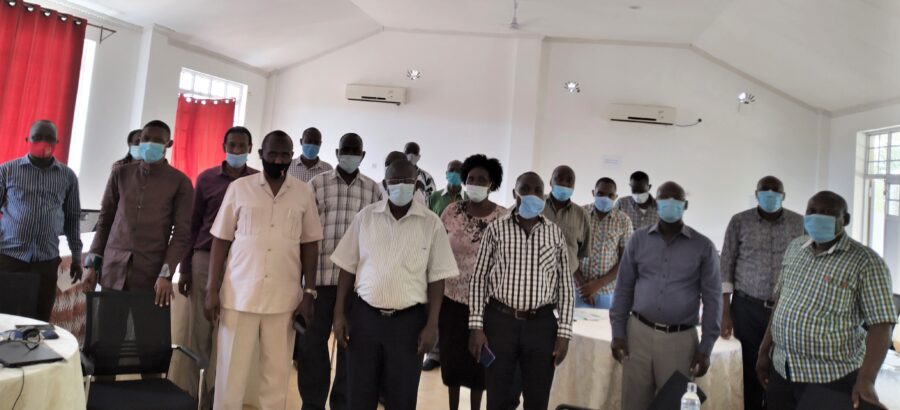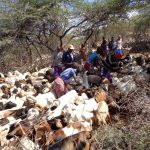Introduction
In contributing towards addressing and supporting priority interventions in the cross-border areas, IGAD, in collaboration with its specialized institutions; EU, UNDP, and GIZ have been jointly working on the “Support for Effective Cooperation and Coordination of the Cross-border Initiatives” (SECCCI) in three clusters namely; South Omo-Turkana (Cluster I), Marsabit-Moyale (Cluster II) and Mandera Cluster (Cluster III) (bordering Ethiopia, Kenya and Somalia).
However, implementation of the SECCCI project is being carried out by different partners, in partnership with IGAD specialized institutions. SECCCI covers cross-border communities of Ethiopia, Kenya, Somalia and Sudan along Clusters I, II, III and IV.
Community dialogues in the two Turkana Sub Counties of Loima and Turkana Central therefore, help IGAD to create sufficient awareness on existing MoUs/agreements for peace building and conflict prevention, livelihood resilience and cross-border trade in the cluster, to further explore ways of bringing these cross-border pastoral communities to peaceful co-existence. A strong foundation for cooperation and coordination with various implementing partners (IPs) in the county will also be laid down during the mission where strong partnerships and relationships with the IPs can be forged at field levels.
Workshop Objectives
- To enhance local capacities and promote knowledge on spate irrigation and receding agriculture that utilizes rain and flood water or inundation canals in Turkana County;
- To demonstrate fodder production, value chain and marketing in ASALs;
- To make good use out of the prosopis juliflora (Mathenge) invasive plants in the county;
- To assess current water harvesting technologies and update government officials about them and to engage in cross-border cooperation at local levels, in regards to development planning progress and specific sectors of expertise;
- To create sufficient awareness, at higher levels, on existing MoUs/agreements for peace building and conflict prevention, livelihood resilience and cross-border trade in the cluster;
- To assess conflict/insecurity situation and identify ways for cross-border peaceful co-existence, pastoral livelihoods resilience, peace building and conflict prevention.
Workshop Deliberations
The workshop was physically attended by 23 participants who included good number of senior Turkana County officials, County women and youth representatives in addition to a number of implementing NGO partners and the NDMA County Coordinator. It was held on 27th – 28th August 2020, at the Cradle Tented Hotel, Lodwar, Kenya.
After the opening remarks, self-introduction and the presentation of objectives and overview of the SECCCI project, the following technical presentations were made and discussed during the two-day workshop.
- Benefits and utilization of the prosopis juliflora plant as animal feed and human food in Kenya and the world by Dr. Richard Kyuma Chumo,
- Spate irrigation and receding agriculture in the ASALs by Mr. Liban Bullo,
- Fodder production, value chain and marketing in ASALs by Mr. Hussein K. Walaga,
- Water harvesting technologies in Turkana County by Eng. Titus Ochieng,
- Updates on rangelands condition and status in the Turkana County by Mr. Abdulkadir Hassan Jillo,
- Brief presentation on IGAD establishment, mandate and its specialized centres, by Dr. Jiddah Choke.
Way Forward
Once technology is availed with associated benefits and lessons from Garissa County where the plant is being utilized as animal feed, there is need to make practical follow up for the utilization of prosopis juliflora as animal feed and human food in Turkana County, which is largely invaded by the plant, more than any other Kenyan County, with the County Government leading in planning and resource mobilization, in collaboration with other partners including IGAD.
- Prosopis juliflora is a plant with potential of being turned from a nuisance into an asset, which can cause the County to shift from being feed scarce to being feed secure & having resilient livelihood. Therefore, it is proposed that Turkana County Government identifies gaps in making use of the prosopis juliflora for possible support by development partners;
- Technologies in fodder production and marketing, spate irrigation, receding agriculture or flood-based farming and water harvesting also exist and the County needs to plan and mobilize resources, in collaboration with development partners and NGOs to put these technologies to use;
- The need for a pilot project to support community transition from nomadism to other alternative livelihood means was raised;
- It is proposed that future capacity building workshops bring together political leaders, technical personnel, civil society organizations and interested members of communities;
- It is proposed that, future projects similar to the SECCCI project to include South Sudan and Uganda cross-border communities.






